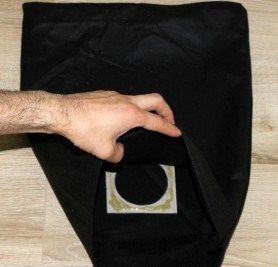What is a HEPA filter for a vacuum cleaner? HEPA is an English abbreviation that means "high-performance particle retention." The principle of operation of the HEPA filter follows from its internal structure.
HEPA Principle filter
The content of the article
- The principle of operation of the HEPA filter
- Device features
- Main classes
- Filter Use
- Life time
 The consumable consists of a fibrous structure of complex shape. As a material, thermoplastic fibers with a diameter from tenths to units of micrometers (microns) are mainly used.
The consumable consists of a fibrous structure of complex shape. As a material, thermoplastic fibers with a diameter from tenths to units of micrometers (microns) are mainly used.
Thanks to this form, filtering occurs in three ways:
- Diffusion - small particles, colliding in a stream of air between themselves and larger fragments, begin to move in all directions, not coinciding with the movement of the air flow, which increases their likelihood to stay at the expense of the arising chaotic or Brownian movement
- Inertia - large particles with high speed are not able to bend around the fibers that fall in the path of their flight, as a result of which the retention effect occurs;
- Engagement is the effect of particles adhering to the filter surface adhering in the immediate vicinity of the fibers.
Device features
 What is a HEPA filter for a vacuum cleaner? HEPA filter systems are located in the final section of the air purification cascade, as they are designed to capture the smallest dust particles.
What is a HEPA filter for a vacuum cleaner? HEPA filter systems are located in the final section of the air purification cascade, as they are designed to capture the smallest dust particles.
In addition to the basic function - fine air purification - they can fight microorganisms. To do this, the internal cavity is treated with an antibacterial composition. Since bacteria can accumulate and develop inside the material over time, it is necessary to monitor the timely replacement of consumables.
Main classes
 What is a HEPA filter in a vacuum cleaner? Such filters are classified according to international standards according to their cleaning efficiency.
What is a HEPA filter in a vacuum cleaner? Such filters are classified according to international standards according to their cleaning efficiency.
Belonging to a particular class is indicated by a specific index, starting with the number 10, which corresponds to the percentage of filtered particles. The table below provides information on all currently existing classes:
| HEPA Filter Index | % of particles to be captured |
| 10 | 85 |
| 11 | 95 |
| 12 | 99,5 |
| 13 | 99,95 |
| 14 | 99,995 |
| 15 | 99,9995 |
| 16 | 99,99995 |
| 17 | 99,999995 |
Today, a good level of cleaning is considered if the device has a filter with a class not lower than HEPA13.
Filter Use
 The scope of devices equipped with such filters is quite wide. They are used in medical facilities and pharmaceuticals, in enterprises with "clean rooms", for example, for the production of high-precision electronic equipment, in air filtration systems of hotel complexes, at enterprises of the food industry, at nuclear power plants for trapping radioactive particles.
The scope of devices equipped with such filters is quite wide. They are used in medical facilities and pharmaceuticals, in enterprises with "clean rooms", for example, for the production of high-precision electronic equipment, in air filtration systems of hotel complexes, at enterprises of the food industry, at nuclear power plants for trapping radioactive particles.
Recently, this technology is actively spreading in everyday life. It is actively and successfully operated by manufacturers of household vacuum cleaners.
Life time
 The efficiency of HEPA filters drops significantly depending on the degree of contamination. If the surface is clean, then dust particles are most actively retained by the fibrous structure.
The efficiency of HEPA filters drops significantly depending on the degree of contamination. If the surface is clean, then dust particles are most actively retained by the fibrous structure.
When the entire surface is filled with dust, new particles adhere to each other, also catching on the inside of the fibers. When a critical mass of garbage is accumulated, a massive detachment of lumps occurs, causing an avalanche effect.
Important! Filters must be washed in a timely manner if they are reusable, or replaced. A characteristic sign that the service time has come is the increased smell of dust during operation of the device.
On average, replacement is required once every 1-3 years. If a large amount of dust is generated in the room, or allergies are often spent in it, consumables must be replaced more often.


